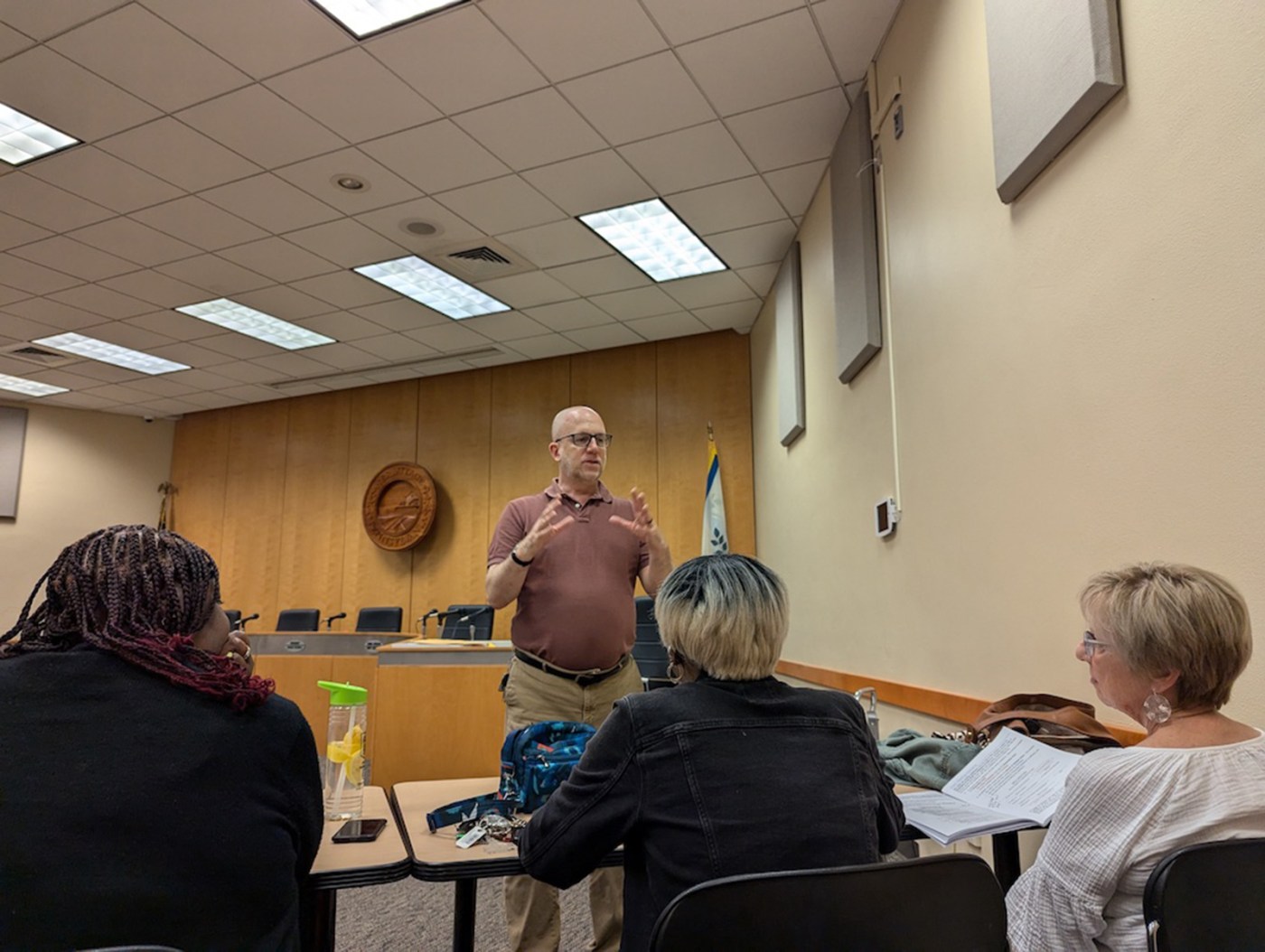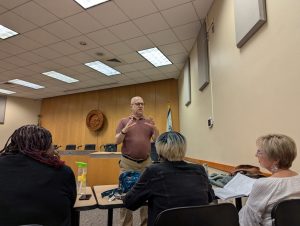
How one swing-state county has escaped election conspiracies
Caitlin Dewey | (TNS) Stateline.org
HERMITAGE, Pa. — Election officials and poll workers across Pennsylvania are braced for a potential flood of misinformation and abuse on Nov. 5, Election Day. But in a drab municipal meeting room north of Pittsburgh, Mercer County Election Director Thad Hall preached a radically different vision.
“I think it’s going to be a really fun election,” Hall told a group of roughly 20 poll workers at a training session in late September.
“You’re going to have a great day,” he told another group that afternoon. “Decide what you’re going to eat in advance. That’s the big question.”
It might sound like an odd note to strike in Pennsylvania, a critical swing state riven by voter fraud conspiracies, protests and lawsuits after the 2020 election. But Mercer — a rural county of about 108,000 that former President Donald Trump won by more than 15,000 votes four years ago — represents a rare island of bipartisan detente, if not all-out agreement.
Local Democratic and Republican leaders both vouch for Hall’s department and the integrity of the county’s voting system. Poll workers shrugged off concerns about the upcoming election. And in training sessions for poll workers and conversations with a reporter, Hall — a 56-year-old Ph.D. wearing khakis and slip-on Skechers — extolled the hectic joys of Election Day with all the corny, rah-rah enthusiasm of a high school gym teacher.
Pennsylvania may rank among the most contested states in the bitterest national election in recent U.S. history. But Mercer County — through some combination of its history, culture and grassroots efforts to bolster voter trust — has thus far escaped most of the rancor, suspicion and misinformation that have come to plague election officials in other parts of the state.
“The issues in Mercer County have been really minimal,” said Jeff Greenburg, a senior adviser for election administration at the nonpartisan good-government group Committee of Seventy, who was Hall’s immediate predecessor in the election bureau. “And that’s at a time when we have major trust issues with many voters.”
Hall is hesitant to call Mercer County a model for other jurisdictions, since at least some of its success relates to the unique history and demographics of the place itself — a Republican county with a recent history of significant labor and Democratic politics, making it fairly centrist.
Located just miles east of Youngstown, Ohio, in the rolling hills of Pennsylvania’s Appalachian Plateau, Mercer opened its first steel mill in 1887 — and for much of the next century, flourished through manufacturing, coal mining and agriculture.
As local steel mills shuttered in the 1980s and ’90s, however, the county’s fortunes and politics both took a turn. After voting for Democrats in five successive presidential elections, Mercer County went narrowly for President George W. Bush in 2004 and has voted for Republican candidates in every contest since by increasing margins.
Registered Republicans now outnumber Democrats by roughly 13,000 people — 38,000 Republicans to 25,000 Democrats, according to the Pennsylvania Department of State.
Election challenges
The undulating two-lane road between Hall’s home near Hermitage and his office in Mercer twists past three modest trailer parks, acres of hay and corn, and at least four dozen Trump/Vance placards. The signs are so popular that Ginny Steese Richardson, the chair of the county Republican Party, has begun rationing them to supporters who live on major roads and highways.
Hall is an outsider to this world: He and his wife moved to Mercer from Flagstaff, Arizona, in August 2020, shortly before that year’s presidential election. But he was no stranger to electoral hiccups, having previously overseen elections in Arizona and South Carolina. He also worked on voter access and administration issues as a researcher for the Federal Voting Assistance Program and the U.S. Election Assistance Commission, among other state and federal organizations.
In Pennsylvania, however, Hall immediately faced new challenges, beginning with a sharp surge of mail-in ballots during the COVID-19 pandemic. About 16,000 people voted by mail in Mercer County in 2020, compared with the roughly 10,000 people expected to vote by mail this year.
An additional 1,500 people voted provisionally after requesting mail-in ballots but heading to polls instead, causing poll workers at one church to mistakenly turn some voters away and creating a cascade of logistical headaches for Hall’s staff. Issues related to mail-in voting ultimately forced the department to hire three temporary employees and approve hundreds of hours of overtime, he told a state legislative committee in 2021.
“I felt bad for him,” said Richardson. “He had a terrible first election.”
Despite these challenges, Mercer County avoided the sorts of conspiracies, allegations and litigation that dominated the 2020 contest in other parts of the state. Republican activists, in particular, falsely claimed elsewhere that local and state election officials had tampered with ballots, hampered poll watchers or otherwise allowed mismanagement and fraud. Trump continues to falsely claim that a significant share of Pennsylvania’s mail-in ballots were fraudulent in 2020 — one of his many lies about the 2020 election that have fueled an uptick in threats and harassment against election workers. Similar claims may gain traction again this year, voting experts fear, because of rules that delay Pennsylvania’s tally of mail-in ballots.
But workers have reported no such abuse in Mercer County, where voters have been known to bring doughnuts to the polls and where workers typically know many of the voters in their precinct personally. In fact, Hall instructs workers to limit personal conversations on Election Day; several precincts faced delays in the past when old neighbors or friends got a little too chatty.
That small-town sense of community has probably helped keep things civil. But some credit is also due to Hall, who is equal parts wonk and cheerleader for the electoral process. Since moving to Mercer, he has cultivated close relationships with the Republican and Democratic party chairs — both of whom, he cheerfully observes, are very small women over 70 years old.
“Thad is just so complying with everyone who gives him a call to ask about things,” said Judy Hines, the Democratic Party chair. “It’s an absolute certainty that there’s no errors or fraud in Mercer County.”
Among other measures, Hall routinely invites Republicans and Democrats to attend tests of the county’s voting machines, and bipartisan teams work together to tally mail-in ballots. In early May, following Pennsylvania’s primary elections, Hall also recruited five Democrats and five Republicans to conduct the county’s post-election hand count, during which his department also audited double the precinct results required by state law.
In a post on LinkedIn, Hall explained that the bipartisan auditors are “ambassadors to the public, explaining why voters should have confidence in our process.” So, too, are Mercer County’s nearly 500 poll workers, most of whom are retirees and some of whom are returning for their second or third presidential election.
In recent trainings, poll workers peppered Hall with detailed, nitpicky questions and leafed through the 70-page manual that outlines their duties and rules. Hall — a great fan of checklists — provided color-coded, step-by-step guides to everything from checking in voters to properly sealing various bags and bins when the polls close.
“I take it as an insult when people ask if we’re doing something wrong,” one longtime Republican poll worker told Hall, lingering after a recent training. “We’re not doing anything wrong. We follow the rules to a T.”
“We always tell people, ‘It’s all run by locals,’” Hall said. “‘Give your locals some credit, really.’”
Trust in elections
But even here in Mercer County, trust in elections has begun to erode around the edges. Residents always have had questions about the voting process, said Greenburg, who became the county’s election director in 2007 before stepping down in 2020. Now, however, a growing share of voters believe so strongly that the election is rigged that “there is nothing an election official can say or show them that might convince them” otherwise, Greenburg said.
Almost 6 in 10 Americans are concerned or very concerned about voter fraud this election, according to a new NPR/PBS News/Marist poll— a figure that rises to 86% among Republicans.
Related Articles
What’s a ‘Jezebel spirit’? Some Christians use the term to paint Kamala Harris with a demonic brush
Asian American evangelicals’ theology is conservative. But that doesn’t mean they vote that way
Analysis: Why Trump’s vision of post-war Gaza has gained little traction
In a close election, here are 3 legal disputes that could reach the Supreme Court
Trump seeks delay in release of evidence in DC criminal case
Across Pennsylvania, Greenburg is particularly concerned about the risk that individual recount petitions or a rogue Board of Elections could delay the certification of results. He also worries about the potential for political violence: Some Pennsylvania counties have installed bulletproof glass and panic buttons in their election offices. Officials in Mercer have also planned extra Election Day security for Hall and his department, though they don’t anticipate needing it.
“We’re living at different times than we used to, unfortunately,” said Bill Finley Jr., a first-term Republican county commissioner. “I feel like we’re at a boiling point in this country with politics, especially at the national level.”
Party and election officials in Mercer County say they’ll fight that tide for as long as they can. Republican commissioners routinely reassure their constituents that elections in Mercer are fair and secure, they told Stateline.
Richardson, the Republican Party chair, said she’s “confident” in the county’s electoral process. Sitting behind her desk at Republican headquarters, where she wore a Trump T-shirt and heart-shaped Trump earrings and drank from two Trump coffee mugs, she shook her head as she recalled dressing down one activist who set up a Trump sign and flag across the street from a group of Democrats who were registering voters.
“I get along OK with the Democrats, and when I have Republicans who harass them, that makes me very unhappy,” she said. “I’d rather just keep things as peaceful as we can.”
Stateline is part of States Newsroom, a national nonprofit news organization focused on state policy.
©2024 States Newsroom. Visit at stateline.org. Distributed by Tribune Content Agency, LLC.


